EVEN with all the optimism in the world, it is impossible to shake the notion that the West Indies team that leaves a week today (November 30) for its tour of South Africa is heading for a certain trouncing.
At the best of times, No.1 against No.8 is an equation that leads to only one conclusion in any sport, especially when No.1 enjoys home advantage.
In this case, an abundance of unwelcome circumstances further enfeeble the underdog.
It is just six weeks since six of the 14 on their way to Johannesburg, including captain Denesh Ramdin, prematurely quit the tour of India over a dispute about contracts and money, throwing West Indies cricket into as serious a crisis as it has ever endured. The fallout still lingers.
Those from the India fiasco duly signed their tour contracts for South Africa last Tuesday under a deal that the new Memorandum of Understanding agreed between the West Indies Cricket Board (WICB) and the West Indies Players Association (WIPA) would be renegotiated. It represents an obvious distraction.
Then there is the question of relations between captain and the others who departed India of their own accord and Marlon Samuels who has emphasized, more than once, that he was against abandonment.
Samuels is a crucial member of the squad for his experience, quality batting and off-spin bowling. It is pertinent that while his teammates were discussing their grievances against the WICB and WIPA in India, he was stroking hundreds in two of the three ODIs played.
This team needs him, Ramdin and the others from India to be committed and cohesive, not suspiciously looking over their shoulders at each other.
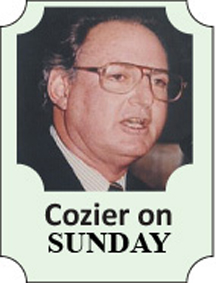 It is a point Brian Lara hinted at in a wide-ranging interview in Sydney last week. Asked about Sachin Tendulkar’s comment that the West Indies were a dark horse in the forthcoming World Cup in Australia and New Zealand, he replied: “They will always be a dark horse. Yes, they have the cricketers but are they going to play as a team?”
It is a point Brian Lara hinted at in a wide-ranging interview in Sydney last week. Asked about Sachin Tendulkar’s comment that the West Indies were a dark horse in the forthcoming World Cup in Australia and New Zealand, he replied: “They will always be a dark horse. Yes, they have the cricketers but are they going to play as a team?”
As Lara would know from his time as captain, a divided and distracted team defeats itself.
Such considerations aside, the team has been appreciably weakened by the withdrawal, “for personal reasons”, of Darren Bravo, by Keiran Powell’s continuing, unexplained absence from cricket of any kind since the first Test against New Zealand in June and by the exclusion of Sunil Narine over doubts that still surround his bowling action.
Bravo and Powell are the most naturally gifted of contemporary West Indies batsmen. In better times, with neither overwhelmed by the problems causing them to opt out of the game that has been their lives, they would both be getting ready to confront Dale Steyn, Morne Morkel, Vernon `Philander and the other uncompromising South Africans in the first Test at Centurion on December 17.
Just under a year ago, Bravo was fashioning a match-saving 218 against New Zealand in Dunedin. He gathered his first Test hundred in the Caribbean against the New Zealanders in June, fittingly at the Queen’s Park Oval, his ground for club and country.
He is a class act, the stamp of Lara, his cousin, evident in his silken, left-handed strokeplay. His average after 32 Tests has declined to 43.60 from over 50 at the start of his career when Steve Waugh described him as “the game’s next superstar, no doubt”. But it still second among current West Indians only to the remarkable Shivnarine Chanderpaul’s 53.10.
Much is made of his difficulty against bodyline bowling but he is hardly alone in that; South Africa would have offered him the challenge of confronting it.
A tall, upright, elegant left-hander, Powell’s statistics are unflattering (average 27.48 from 21 Tests); they speak more of his inconsistency than his potential.
His hundreds in each innings against Bangladesh in Dhaka in 2012 elevated him into elite company of West Indians who had previously completed such a double – Headley, Weekes, Walcott, Sobers, Kanhai, Rowe, Greenidge and Lara. He can only aspire to such heights again by playing.
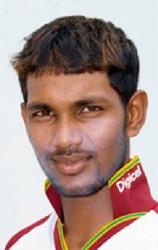
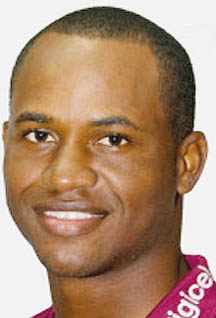
Assad Fudadin has been drafted in as a replacement for Bravo. He is a left-hander altogether different in method, a solid accumulator rather than an exciting dasher. The last of his three Tests was against England at Edgbaston two and a half years ago. His selection was presumably clinched by his 103, opening in the third four-day match on the ‘A’ team in Sri Lanka last month.
He is 29 and averages a modest 33.12 in 74 first-class matches. Clyde Lloyd and his fellow selectors could have closed their eyes, stuck a pin into the available candidates and come up with several with similar records.
Fudadin’s Guyana teammate, Narsingh Deonarine, has shown early form in the WICB’s new Professional Cricket League with hundreds in his first two innings, against the Leewards and Windwards.
At 31, he is a seasoned, well-travelled cricketer, a left-handed batsman and off-spinner with 18 Tests, 120 first-class matches and previous tours with the West Indies in Australia, England, India, New Zealand, Sri Lanka and Zimbabwe on his c.v.. The drawback is that his numbers don’t match his experience, an average of 25.89 and no hundreds in 30 Test innings.
Kirk Edwards, a right-hander with 17 Tests to his name, would have been as useful an option as any except for the persistent back injury that has kept him out of the Barbados team for the first two rounds of the new Professional Cricket League.
A doubt over fitness has not precluded the selectors from accommodating Sheldon Cottrell, the left-arm fast bowler whose promise and work ethic have impressed Lloyd.
Cottrell returned from the ‘A’ team tour of Sri Lanka with a damaged hamstring; he had no cricket prior to his inclusion in the squad. Now he has been given Jamaica’s third round PCL match against Trinidad and Tobago at the Queen’s Park Oval November 28-December 1 to give the selectors “an opportunity to assess his match readiness”.
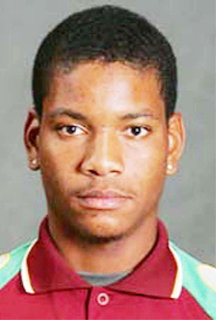
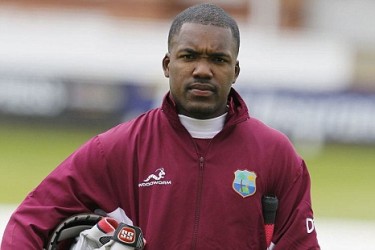
It means he won’t travel with the team on Sunday; if fit, he would arrive in South Africa well in time for the only warm-up match, against a South Africa Invitation XI in Benoni.
Such a brief build-up to the real business of three Tests has become standard opening procedure for international tours; it is hardly proper preparation for the real business of three back-to-back Tests against the game’s present champions.
As it is, Samuels, excluded by Jamaica for the PCL matches for breaching regulations, goes without a first-class match since he was dropped after the first Test against New Zealand last June.
Fast bowler Jerome Taylor and left-arm Sulieman Benn are also short of match practice. They missed their team’s opening match of the season and have watched from the pavilion as the rain teamed down for the last two days in Barbados without being able to bowl a ball in their scheduled match.
All in all, it makes for a discouraging scenario.









